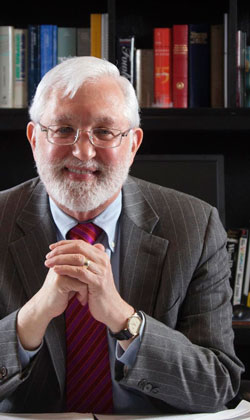Judge Jed Rakoff’s stance on the SEC deals draws fire, praise—and change

Photo of U.S. District Judge Jed Rakoff by Stringer/Reuters/Corbis.
Over lunch in New York City in 2009, U.S. District Judge Jed Rakoff took a dare. Then-executive assistant U.S. attorney Fred Virella complained that the prosecutor’s office had lost four games in a row in the Lawyers Co-Ed Softball League. Rakoff joked that it likely had to do with Virella being team manager.
A can-you-do-better retort led to a one-game stint for Rakoff as manager. And the judge cut an unusual figure on the field for that game against the Patterson Belknap Webb & Tyler law firm.
“I wore my robe because I figured that would intimidate the umpire and all the close calls would go my way,” Rakoff says with his characteristic growl of a laugh and a light slap of his palm on the see-through glass desk. His capacious, cluttered chambers provide plenty of testament to his being an inordinately serious baseball fan (of the Yankees, to be exact).
What was the rookie manager’s genius in an 11-1 victory? As Rakoff tells it, he had his team’s least experienced players, its two women, bat first and second. He figured the opposing pitcher would be more hittable at the outset before getting a feel for his best pitches.
Rakoff was not in his robe in the sixth inning when he made his only mistake: putting himself in the game. He stepped into the batter’s box wearing his business suit and dress shoes, with runners on base and an opportunity to drive in more runs. But he hit into a double play, falling ingloriously as his leather soles lost traction in the dash toward first base.
“At that point I noticed there were an awful lot of players from both sides taking pictures,” says Rakoff. “That concluded my career.”
In softball, that is.
Despite taking senior status in the federal Southern District of New York in 2010, to which he was nominated in 1995 by President Bill Clinton, Rakoff works more than the customary full time and is at the top of his game on the judicial bench. That he wore his robe in a softball game says something about how comfortable he is in it—and in his own skin.
That is probably best. Away from competitive frivolity in a city park, Rakoff has been engaged in figurative hardball at the highest levels in the years since the economy tanked. Setting himself up as an antagonist and sparking a rivalry between two branches of government, Rakoff has been a singular voice of backlash against what he sees as regulatory laziness in the face of financial misdeeds that helped grease our nation’s skid into a state of economic siege.
Click here to read the rest of “The judge who said no” from the October issue of the ABA Journal.
Write a letter to the editor, share a story tip or update, or report an error.


